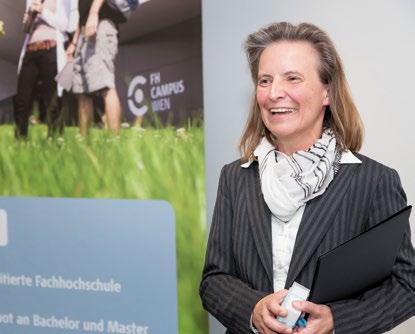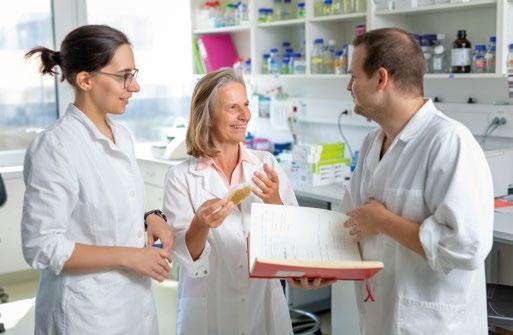
8 minute read
In der Forschung aufgehen
Wer Ines Swoboda je dabei zugehört hat, wie sie über das Studium Molekulare Biotechnologie und die damit verbundenen Möglichkeiten spricht, ist versucht, sich umgehend dafür zu bewerben. Auch abseits der Lehre vermittelt sie Interessierten seit vielen Jahren mit Begeisterung, was dahintersteckt, wenn das Immunsystem aufgrund einer Allergie verrücktspielt. Die Biotechnologin ist mehrfach Pionierin: Sie entdeckte ein Allergen im Hühnerfleisch, ist an mehreren Patenten beteiligt und betreibt Wissenschaftskommunikation nicht erst, seit der Begriff in Mode ist.
Advertisement
Viel zu erforschen …
Es ist die Biologielehrerin im Gymnasium, die Ines Swoboda auf die Genetik aufmerksam macht und darauf, dass es noch vieles zu erforschen gibt. Die Botschaft wirkt nach, dennoch maturiert sie in Physik, für die ein CERN-begeisterter Lehrer sie zu fesseln weiß.
Genetik und Immunologie: Faszinierend!
Ines Swoboda beginnt, Physik und Biologie an der Universität Wien zu studieren – und schon die ersten Genetikvorlesungen machen ihr klar, wohin es für sie gehen soll. Nach einem Jahr lässt sie das Physikstudium sein, um vollends in die faszinierende Welt der Genetik und Immunologie einzutauchen.
Allergisch auf Tabak, Herr Professor?
Ende der 1980er-Jahre weiß man schon einiges über das Birkenpollen-Hauptallergen Bet v 1, dennoch sind noch viele Fragen offen. Also macht Ines Swoboda Bet v 1 zum Thema ihrer Diplomarbeit. Und es stellt sich eine weitere Forschungsfrage: Warum war Erwin Heberle-Bors, Genetiker und Betreuer ihrer Diplomarbeit, allergisch auf Tabak? War etwa das Bet v 1-verwandte Molekül in der Tabakpflanze der Grund dafür? Nein, lautet die nun wissenschaftlich abgesicherte Antwort in ihrer Arbeit „Untersuchungen zur Expression des Pollenallergiegens Bet v 1 in Birke und Tabak“.
Achtung Mikroben: Bet v 1-Produktion!
Ihre Dissertation „Isolation and characterisation of a birch gene family encoding pollen allergens and pathogenesis-related proteins“ an der Universität Wien ist die Weiterführung der Diplom-
Anyone who has ever listened to Ines Swoboda talk about studying molecular biotechnology and the opportunities it offers is tempted to apply immediately. Apart from teaching, she has been enthusiastically informing interested parties about what is behind the immune system going crazy due to an allergy. The biotechnologist is a pioneer on many fronts: she discovered an allergen in chicken meat, is involved in several patents and has been communicating science since before the term even became fashionable.
Much to explore ...
It is the biology teacher in high school who makes Ines Swoboda aware of genetics and that there is still a lot to be researched. The message has an effect, but she graduates in physics, a subject that has captivated her since having a teacher who is enthusiastic about CERN.
Genetics and Immunology: Fascinating!
Ines Swoboda starts to study physics and biology at the University of Vienna and already the first genetics lectures make it clear to her which direction she should take. After one year, she gives up her physics studies to completely immerse herself in the fascinating world of genetics and immunology.
Allergic to tobacco, Professor?
At the end of the 1980’s, a lot is known about the main birch pollen allergen Bet v 1, but many questions still remain unanswered. So Ines Swoboda makes Bet v 1 the subject of her diploma thesis. And another research question arises: Why is Erwin Heberle-Bors, geneticist and supervisor of her thesis, allergic to tobacco? Is it the Bet v 1-related molecule in the tobacco plant that causes this? No, is the scientifically proven answer in her work "Studies on the expression of the pollen allergy gene Bet v 1 in birch and tobacco".
Attention microbes: Bet v 1 production!
Her dissertation "Isolation and Characterization of a Birch Gene Family Encoding Pollen Allergens and Pathogenesis-Related Proteins" at the University of Vienna is the continuation of her diploma thesis, but in the direction of plant genetics. Ines
arbeit, allerdings in Richtung Pflanzengenetik. Nun will Ines Swoboda herausfinden, warum die Pflanze ein bestimmtes Molekül produziert. Wie so oft in der Wissenschaft, ist das Ergebnis einem „Unfall“ geschuldet. Eine bakterielle Kontamination im Versuch zeitigt ein verblüffendes Ergebnis: Mikroben veranlassen die Pflanze, das Birkenpollen-Hauptallergen, Bet v 1, nach Pathogenbefall zu produzieren, um damit Schädlinge abzuwehren. Daraus entstand eine der ersten von weiteren viel beachteten Publikationen.
Graspollen in Down Under, Fisch- und Schimmelpilze in Wien
1995 folgt ein vierjähriger Aufenthalt in Australien, am Plant Molecular Biology and Biotechnology Laboratory, Institute of Land and Food Resources, University of Melbourne. Hier forscht Ines Swoboda an der Schnittstelle von Pflanzengenetik, Allergien und Immunologie an Graspollen-Allergenen und allergenfreien Gräsern. Es folgen Publikationen und Patentanmeldungen, an denen sie maßgeblich beteiligt ist. Wieder zurück in Wien, setzt sie sich am AKH erstmals mit Fischallergien auseinander, wechselt an die neu gegründete Medizinische Universität und leitet eine Forschungsgruppe, die sich unter anderem mit Schimmelpilzallergien beschäftigt.
Großes Glück: Forschen und Lehren an der FH Campus Wien
Schon längere Zeit lehrt Ines Swoboda im Diplomstudium Biotechnologie der FH Campus Wien und betreut Abschlussarbeiten von Studierenden. 2011 wechselt sie schließlich an die Fachhochschule und leitet die Forschungsgruppe Immunologie – und macht eine neue Erfahrung: Sie kann weiterhin Forschung betreiben und dennoch in der Lehre sein, was sie vom ersten Tag an für die Fachhochschule einnimmt. Sie schätzt die Interaktion mit den Studierenden und diese schätzen ihre umfassende Expertise. Die Liste der von ihr betreuten Abschlussarbeiten ist beeindruckend lang. Swoboda now wants to find out why the plant produces a certain molecule. As is so often the case in science, the result is due to an "accident". A bacterial contamination in the experiment produces an amazing result: It is microbes that cause the plant to produce the main birch pollen allergen, Bet v 1, after a pathogen attack in order to repel pests. This results in one of the first of many further highly regarded publications.

Grass pollen down under, fish and mold in Vienna
Starting in 1995, she spends four years at the Plant Molecular Biology and Biotechnology Laboratory Institute of Land and Food Resources at the University of Melbourne in Australia. She conducts research at the interface between plant genetics, allergies and immunology on grass pollen allergens and allergenfree grasses. This is followed by publications and patent applications in which she is significantly involved. Back in Vienna, she deals with fish allergies for the first time at the AKH, moves to the newly founded Medical University and heads a research group that deals, among other things, with mold allergies.
Happiness found: researching and teaching at FH Campus Wien
Ines Swoboda teaches for a long time in the degree program Biotechnology at FH Campus Wien and supervises the theses of many students. In 2011, she ultimately switches to the university of applied sciences and heads the immunology research group where she experiences something new: she can continue to do research and still teach, which she does from day one for the university of applied sciences. She appreciates the interaction with the students and they appreciate the extensive expertise of Ines Swoboda. Her list of supervised theses is impressively long.
Allergy research and microbiomes
Ines Swoboda continues her research on fish, meat and mold allergens at FH Campus Wien. In addition, she also researches
Allergieforschung und Mikrobiome
An der FH Campus Wien führt Ines Swoboda ihre Forschungen zu Fisch-, Fleisch- und Schimmelpilz-Allergenen weiter. Dazu kommen respiratorische Allergien, denn auch hier gilt: Einiges weiß man, vieles ist noch herauszufinden. Großes Potenzial sieht sie in der Mikrobiomforschung, in der es viele Synergien mit Bioinformatikerin Alexandra Graf gibt, die ebenfalls an der FH tätig ist. Was sich mit Sicherheit sagen lässt: Ines Swoboda hat schon viel herausgefunden, und dies wurde honoriert.
Beste Dissertation und „Future People“
Ines Swoboda schloss sowohl ihr Diplom- als auch das Doktoratsstudium mit ausgezeichnetem Erfolg ab. Sechs Auszeichnungen gehen im Laufe ihrer Karriere auf ihr Konto, darunter der „PhD Thesis Award“ der Österreichischen Gesellschaft für Molekulare Biowissenschaften und Biotechnologie für die beste Dissertation im Jahr 1995 oder der Kardinal-Innitzer-Preis für ihre Habilitation. 2019 reihte sie das Zukunftsinstitut in die Liste der „Future People“ für ihre Forschungen an In-vitro-Testsystemen als Alternative zu Tierversuchen. Eines der jüngeren Forschungsprojekte, zu dem noch viel die Rede sein wird.
Wissenschaft braucht Kommunikation
Ihr Wissen hinauszutragen und Forschungsergebnisse auch außerhalb der akademischen Welt zu zeigen, ist Ines Swoboda sehr wichtig. Sie engagiert sich bei Open Science/Vienna Open Lab und schwärmt davon, wie bereichernd es ist, sich mit Besucher*innen auszutauschen – egal ob Biologielehrer*innen oder Kindern. Denn daraus entstünden wieder „super Ideen“.
Glücklich in der Forschung
Diese Haltung und die Freude an der Wissenschaft sind es, die Ines Swoboda ihren Studierenden weitergeben möchte. „Es ist unglaublich schön zu beobachten, wenn der Funke überspringt. Studierende plötzlich von der Forschung fasziniert sind und vollkommen in ihren Forschungsprojekten aufgehen.“ respiratory allergies, because here too, the following applies: some things are known, but much still remains to be found out. She sees great potential in microbiome research, in which there are many synergies with bioinformatician Alexandra Graf, who also works at FH Campus Wien. What can be said with certainty: Ines Swoboda has already found out a lot, and this has been rewarded.
Best dissertation and “Future People”
Ines Swoboda completed both her diploma and doctoral studies with excellent results. She has received six awards in the course of her career, including the "PhD Thesis Award" from the Austrian Society for Biotechnology for the best dissertation in 1995, and the Kardinal Innitzer Prize for her postdoctoral qualification. In 2019, the Zukunftsinstitut added her to the list of "Future People" for her research on in vitro test systems as an alternative to animal experiments. One of the more recent research projects that will be discussed a lot more in the future.
Science needs communication
It is very important to Ines Swoboda to spread her knowledge and to show research results outside of the academic world. She is involved in Open Science / Vienna Open Lab and raves about how enriching it is to exchange ideas with visitors, regardless of whether they are biology teachers or children, and how these interactions can lead to "great ideas".
Happy in research
This attitude and the joy of science is what Ines Swoboda would like to pass on to her students. "Because it is incredibly nice to see that moment in which you spark the interest of the students and they suddenly become fascinated by research and completely absorbed in their research projects."










